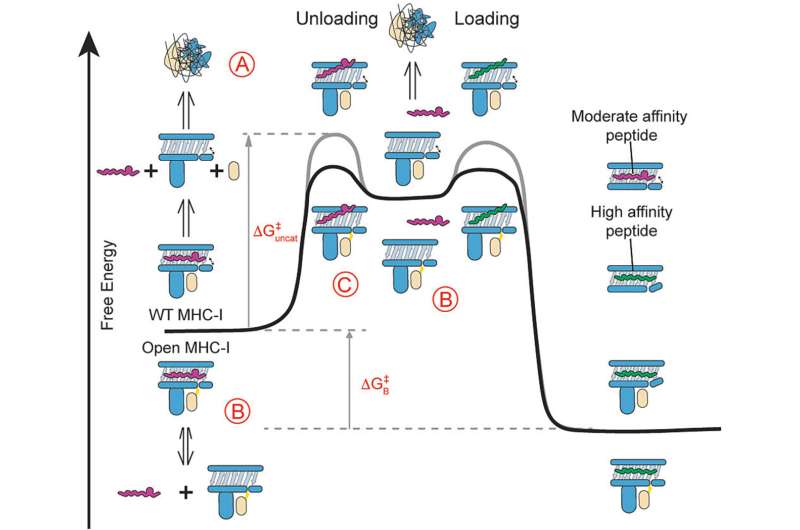This article has been reviewed according to Science X's editorial process and policies. Editors have highlighted the following attributes while ensuring the content's credibility:
fact-checked
peer-reviewed publication
trusted source
proofread
Researchers develop universal MHC molecules that can be produced rapidly at scale

Class I major histocompatibility complex (MHC-I) proteins play an essential role in the immune system of all jawed vertebrates. The MHC-I displays peptide fragments of proteins from within the cell on the cell surface, "presenting" them to the immune system, which is constantly scanning the body for foreign or toxic antigens.
When foreign peptides are identified, they trigger a cascade that allows cytotoxic T cells to eliminate intruders. This process has been exploited in the development of both vaccines and immunotherapy, wherein researchers identify fragments of peptides unique to viruses or cancer and then screen for T cells that recognize those targets and initiate an immune response.
However, the current process of using MHC-I molecules as probes in vaccine and immunotherapy development is laborious. MHC-I molecules are extremely unstable, and making just one of these molecules can take a week, making it prohibitive to scan large libraries of peptides in an efficient manner.
Now, researchers from Children's Hospital of Philadelphia (CHOP) have potentially solved this problem by engineering stable, universal MHC-I molecules that can be produced rapidly at scale, allowing researchers not only to develop vaccines and immunotherapies more quickly but also to identify molecules that can work broadly across the population. The findings are published in the Proceedings of the National Academy of Sciences.
"The findings in this paper have the potential to revolutionize this field, both in the way we manufacture these molecules and the rate at which we can screen for effective and universal immunotherapies," said senior author Nikolaos G. Sgourakis, Ph.D., Associate Professor in the Center for Computational and Genomic Medicine at Children's Hospital of Philadelphia. "We are no longer limited by the instability of these molecules and the long timeframe it used to take to manufacture them. These stabilized MHC-I molecules could speed up the screening process and the subsequent development of effective therapies."
Led by Sgourakis Lab members Yi Sun, Michael C. Young, and Claire H. Woodward, the researchers stabilized MHC-I molecules by focusing on their 3D structure. Classical MHC-I molecules are comprised of three major parts: a peptide antigen consisting of 8 to 15 amino acids; a light chain that is the same for all MHC-I molecules; and a highly polymorphic heavy chain.
In humans, the MHC-I is called human leukocyte antigen, or HLA, which has expanded because of constant evolutionary adaptation in the human population to include more than 35,000 variants, with a variety of different residues located on groove where peptides can bind. Because HLA is so polymorphic, different HLA types display different peptide repertoires, bind different molecular chaperones, and display different T cell receptors (TCRs), which ultimately define immune responses and disease susceptibility. Thus, finding universal targets and immunotherapies that work across the human population has been challenging.
To stabilize MHC-I and make it useful for universal peptide loading and screening, the researchers focused on the light chain of the molecule, since it is conserved across HLA types. The light chain performs an important role in stabilizing MHC-I molecules. As soon as the light chain falls off, it triggers the MHC-I molecule to disassemble, at which point it is essentially sent for recycling for future peptide loading, serving as a sort of "on/off" switch for the MHC-I molecule. To exploit this fundamental engineering, the researchers tethered the heavy chain to the light chain, stabilizing the MHC-I in a conformation that is "open" and receptive to peptides.
The researchers confirmed the stability of these engineered MHC-I molecules through biophysical characterization, using nuclear magnetic resonance (NMR), showing that their open MHC-I molecules have enhanced stability when loaded with peptides, even those of low to moderate affinity. The researchers also demonstrated that their engineered MHC-I molecules promote peptide exchange across multiple HLA allotypes, covering representatives from five HLA-A, six HLA-B supertypes, and HLA-Ib molecules, which have many different forms.
A key component of using this system to enable a high-throughput peptide exchange platform was the design of customized "placeholder" peptides containing unnatural amino acid modifications, which was done in close collaboration with the lab of chemical biologist George Burslem, Ph.D., at the University of Pennsylvania.
"The open MHC-I platform leverages minimal protein modifications to enhance ligand exchange reactions across all known HLA allotypes, as well as oligomorphic MR1 molecules which present aberrant metabolites that are associated with many tumors," Dr. Sgourakis said. "These new molecules could be a versatile tool for screening antigenic epitopes, enabling the detection of low-frequency receptors and engineered antibodies for the development of targeted therapies."
More information: Yi Sun et al, Universal open MHC-I molecules for rapid peptide loading and enhanced complex stability across HLA allotypes, Proceedings of the National Academy of Sciences (2023). DOI: 10.1073/pnas.2304055120
Journal information: Proceedings of the National Academy of Sciences
Provided by Children's Hospital of Philadelphia





















